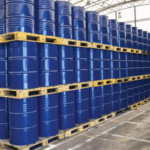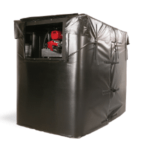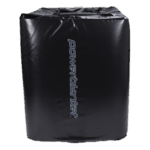Have you ever heard of IBCs and wondered what they are? Well, you’re not alone. IBCs are a key component of many industries in shipping and storage.
This blog will break down the basics of IBCs and explore the different types. Keep reading to learn about the IBC containers, their uses, and how they could benefit your business.
What Does IBC Stand For?
IBC stands for Intermediate Bulk Container. They are also called IBC tanks, IBC totes, IBC, or pallet tanks. An IBC is a container or tank for transporting and storing various liquids and solid products.
IBCs are common in various industries, including manufacturing, chemicals, petroleum, pharmaceuticals, food, and beverage.
What Is An IBC Tote Tank and What Are Its Uses?
An IBC is a container to store and transport liquids, solids, and semi-solids. They are constructed from high-density polyethylene (HDPE) or stainless steel and are typically cubicles with 1000 liters or more capacity.
IBC tanks offer a safe, efficient, and secure way to transport and store chemicals, petroleum, food, and beverage products. They are also used in the brewing industry to store and transport beer, wine, and spirits.
Types of IBCs
IBCs come in two main types, rigid and flexible.
1. Rigid IBCs
Rigid IBCs are made of high-density polyethylene. They are typically stackable and require minimal maintenance. They are also leak-proof and highly secure, making them a safe and reliable option for storing and transporting hazardous materials.
Rigid IBCs are available in various sizes and capacities, ranging from 250 liters to 1,000 liters. They are also available in various shapes and configurations, including palletized, box-style, and cage-style IBCs.
2. Flexible IBCs
Flexible IBCs use a flexible material, such as PVC. They are typically not stackable, but they are leak-proof. They are a good option for storing and transporting hazardous materials.
Flexible IBCs are available in identical sizes and configurations as rigid, ranging from 250 liters to 1,000 liters.
Flexible IBCs are typically less expensive than rigid IBCs.
How to Choose The Right IBC Tote Tank for Your Needs
When selecting an IBC tote tank, consider your purpose, budget, and capacity. The type of products you will store, or transport will dictate the kind of tote material. For example, stainless steel is the best option for food-grade totes.
If you are looking for a long-term solution for storing and transporting, consider a rigid IBC. Rigid IBCs are designed to last years without requiring maintenance. Examples of products stored in these containers include:
- Food & Beverage – Sauces, syrups, tomato paste, juices, and concentrates
- Dairy – Fluid milk, cream, liquid eggs, and yogurt
- Personal Care – Shampoos, lotions, creams, gels, and liquid soap
- Chemical – Additives, pigments, inks, and surfactants
Flexible IBCs are woven polypropylene plastic, the same material as milk jugs. It’s a long-fiber plastic that provides strength but remains lightweight. They often have specialized liners or bags and carry grain, pharmaceutical ingredients, and powdery construction materials.
The Benefits of Using IBC Tote Tanks
IBCs offer many benefits over traditional drums and barrels, but one of the biggest is that they are stackable, saving valuable storage space. They have a large surface area, which makes them ideal for heating or cooling the contents.
IBC tote tanks offer several benefits, including:
Portability: Easily transported using a forklift or pallet truck.
Cost-effectiveness: Typically less expensive than other types of containers, making them ideal for budget-conscious businesses.
Durability: Designed to last years, making them a long-term storage and transport solution.
Versatility: IBCs can store and transport various materials, including liquid food products, chemicals, oils, and solids.
Security: Leak-proof and highly secure, making them a safe and reliable option for storing and transporting hazardous materials.
How Long Do IBC Totes Last?
IBCs can potentially last for decades. Stainless steel tanks are nearly indestructible if cared for properly. It depends on the material and how they are maintained.
Flexible IBCs may not last as long as rigid IBCs. Corrosive chemicals and UV rays from the sun can lead to the deterioration of plastic totes.
IBC Tote Reuse and Recertification
IBCs can be used multiple times, depending on their condition. Totes should be reinspected at least every 30 months, depending on use. According to DOT regulations, an inspection must meet the Code of Federal Regulations [49 CFR 173.32].
If they are in good condition, they can be recertified and reused. IBC tote recertification involves inspecting and testing the IBC to ensure it meets safety regulations.
Maximum Temperature for IBCs
HDPE tanks should never hold products above 120°F (49°C). High temperatures can cause the container to warp, crack, or leak.
Stainless steel tanks can keep products at higher temperatures of 212°F (100°C) and are widely used in the brewing industry to store and transport beer, wine, and spirits.
IBCs for Independent Breweries
Stainless steel conducts heat better than plastic and does not impart any flavors to the brew. Many winemakers and brewers choose stainless IBC totes because they can regulate the temperature better. Brewers and winemakers can use tote heaters to maintain critical fermentation temperatures in cold rooms.
How to Care For and Maintain Your IBC Tote Tank
IBC tanks last for years with proper care. Here are some tips for managing and maintaining your IBC tote:
- Inspect the IBC regularly for signs of wear and tear.
- Clean and sanitize regularly.
- Store in a cool, dry place.
- Avoid exposing the IBC to temperatures above 120°F (49°C).
- Avoid cleaning with harsh chemicals or abrasives.
An excellent way to protect totes from extreme environments is to use IBC tote covers.
IBCs – Strong, Durable Containers
When storing and transporting goods, the IBC container withstands the rigors of handling and transportation. They are the best choice for companies looking to protect their valuable products. IBCs have a range of sizes and materials to choose from and are versatile enough to meet the needs of any industry.
So if you are looking to store or transport temperature-sensitive materials, explore tote heaters to maintain the right temperature. Powerblanket IBC tote warmers and heaters are the industry standard.
Keep your temperature-sensitive materials at the right temperature with Powerblanket IBC tote warmers and heaters.





